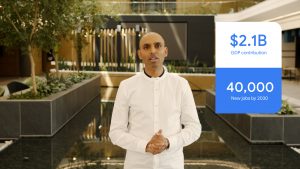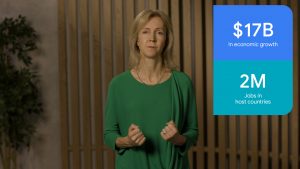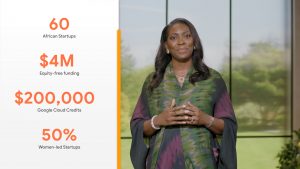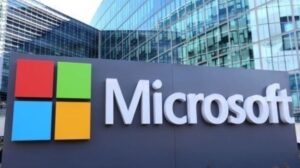Telecom
How Google is Delivering on its $1B Commitment to Africa
Google on Wednesday announced its intent to establish a new Google Cloud region in South Africa – its first on the continent. The news, which came at the second Google for Africa event, is the latest example of how Google is delivering on the $1bn investment commitment made last year by the company’s CEO, Sundar Pichai.

The new Cloud Region will help users, developers, businesses and educational institutions across Africa to move more information and tools online, improve access options for customers and in turn, create jobs.
According to research by AlphaBeta Economics commissioned by Google Cloud, the South Africa cloud region will contribute more than a cumulative USD 2.1 billion to the country’s GDP, and will support the creation of more than 40,000 jobs by 2030.
Niral Patel, Director of Google Cloud Africa said: “We believe in growing an open and healthy ecosystem of technology solutions to support Africa’s digital transformation goals, which leads to more opportunities for businesses.
“It is part of our company-wide ethos to respect the environment, which is why we operate the cleanest cloud in the industry, supporting sustainable digital transformation,” he added.

“Along with the cloud region, we are expanding our network through the Equiano subsea cable and building Dedicated Cloud Interconnect sites in Johannesburg, Cape Town, Lagos and Nairobi. In doing so, we are building full scale Cloud capability for Africa.”
Google Cloud is already working with customers across the continent – helping them solve business critical challenges, get online, and access the benefits of digital technology.
In South Africa, Google Cloud works with leading retailer TakeAlot to help their three million local customers enjoy a hassle free online shopping experience. TakeAlot built its e-commerce platform on Google Cloud, which has enabled the business to avoid system crashes during high traffic periods like Black Friday.
While in Kenya, Google Cloud works with Twiga Foods – a technology driven company addressing and improving food security in Africa – helps them connect 1,000 farmers to 140,000 vendors, delivering 12,000 orders every day and storing two million kilograms of fresh produce.”

Deputy Minister of Communications and Digital Technologies Philly Mapulane (South Africa): “Our National Development Plan 2030 calls for stimulating growth in the Information, Communication and Technology (ICT) sector and innovation by driving public and private ICT investment, especially in network upgrades and expansion. Google’s recent efforts in this regard have been particularly encouraging.
“The Equiano cable landed in Cape Town recently, and the improved speed and reduced internet costs that this can deliver has the potential to drive much fuller Internet participation for many more South Africans.”
Earlier this year, Google announced plans to open its first African product development centre in Nairobi to develop and build better products for Africans and the world.
Today, Google announced the launch of voice typing support for nine more African languages in Gboard, the Google keyboard (isiNdebele, isiXhosa, Kinyarwanda, Northern Sotho, Swati, Sesotho, Tswana,Tshivenda and Xitsonga) – while 24 new languages are now supported on Google Translate, including Lingala, which is used by more than 45 million people across Central Africa.
To make Maps more useful, Google also refreshed Street View in Kenya, South Africa, Senegal and Nigeria with nearly three hundred thousand kilometres of imagery. This helps people virtually explore and navigate neighbourhoods on Google Maps. They are also extending the service to Rwanda, meaning that Street View is now available in 11 African countries.

Africa’s internet economy has the potential to grow to $180 billion by 2025 – 5.2% of the continent’s GDP. To support African entrepreneurs in growing and developing their talent, Google continues to support African small businesses through the Hustle Academy and Google Business Profiles, and to help job seekers learn the skills they need through Developer Scholarships and Career Certifications.
Google, through its $50 million Africa Investment Fund that targets equity investments in tech startups, has since invested in three businesses over the past 9 months – SafeBoda, a transportation app in Uganda and Nigeria, Carry1st, a South African mobile gaming startup and Lori Systems, an e- logistics company based in Kenya.
Nitin Gajria, Managing Director, Google Africa added “We are collaborating with governments, policymakers, NGOs, telcos, business leaders, creators and media so that we can help accelerate Africa’s digital transformation. And it’s the talent and drive of the individuals in the countries and communities of Africa that will power Africa’s economic growth,” he adds.
Milestones achieved include the subsea cable, Equiano, now running through Togo, Nigeria, Namibia and South Africa, which is expected to deliver faster, lower cost internet to the continent by connecting St. Helena, Togo, Nigeria, Namibia and South Africa with Europe. A recent economic impact assessment conducted by Africa Practice and Genesis Analytics found that by 2025, the cable is set to accelerate economic growth with GDPs of Nigeria rising by USD 10.1 billion, South Africa USD 7 billion and USD 260 million in Namibia.

During the same time, Equiano should indirectly create 1.6 million jobs in Nigeria, 180,000 in South Africa and 21,000 in Namibia, driven by the expansion of the digital economy and peripheral sectors.
Vice President Dr. Mahamudu (Ghana): “This event provides a quintessential platform for us as Africans, together with our partners, to demonstrate the importance of helpful partnerships between governments and the private sector in addressing African challenges. The Ghanaian government is proud of our partnership with Google through several initiatives.”
Google is also supporting nonprofits working to improve lives in Africa with a $40 million cash and in-kind commitment. Last year, 7,500 career scholarships were disbursed to help young people learn new skills and build their careers while Uganda’s AirQo received a $3 million grant to support the expansion of their work on monitoring air quality from Kampala to ten cities in five countries on the continent.
Recently Google partnered with the UN to launch the Global Africa Business Initiative (GABI), a global partnership aiming to accelerate Africa’s economic growth and sustainable development.
Telecom
Nigeria Has World’s Most Affordable Data Costs – GSMA
Nigeria has an average data cost of $0.38 per gigabyte, making her the most affordable countries globally and one of the cheapest in Africa for mobile data services.

United States averages $6 per gigabyte and South Africa with $1.77 per gigabyte rank the highest globally and in Africa respectively.
According to the GSMA, Nigerian data costs, as a percentage of Gross National Income (GNI) per capita, are among the lowest across Africa.
The reports by the body lends weight to telecom operators advocacy for tariff adjustments to address economic pressures threatening the sector’s sustainability.
The GSMA report, titled “The Role of Mobile Technology in Driving the Digital Economy in Nigeria,” highlighted Nigeria’s competitive data pricing, which is significantly lower than other African nations, such as Kenya ($0.59 per gigabyte), Ethiopia ($0.68 per gigabyte), and South Africa ($1.77 per gigabyte).
By contrast, the United States averages $6 per gigabyte, underscoring Nigeria’s advantage in offering cost-effective connectivity.
The cost of mobile data in Africa varies greatly by country and region.
Data costs can refer to the cost of mobile data or the cost of acquiring, maintaining, and using business data.
In 2023, the average cost of 1 GB of mobile data in Sub-Saharan Africa was $3.31, while in Northern Africa it was $0.86.
Telecommunications operators in Nigeria have been requesting some policy changes as well as tariff rebalancing to enable them deliver support to the Government’s digital economy objectives.
They have called for the simplification and improvement of the Right of Way (RoW) charging and administration process, harmonised across the country
According to them, all government authorities (at national and sub-national levels) should apply the national maximum RoW fee of N145 per/LSQM adopted by the National Economic Council (NEC) for the deployment of fibre across all states in Nigeria.
There should be a single point of contact in each state for the RoW application process while the duration for the approval process should be digitalised and limited to a maximum of one month.
Simplification and reduction of the tax burden on the mobile sector
On tariff, recall that the Association of Licensed Telecommunications Operators of Nigeria (ALTON) and the Association of Telecommunications Companies of Nigeria (ATCON) had urged the Nigerian Communications Commission (NCC) to consider reviewing tariffs upward to address rising operational costs.
Nodding in agreement, Bismarck Rewane, chief executive officer, Financial Derivatives, said the proposed tariff hike by telecommunications will help reduce inflation in the country.
He said it would help to reduce inflation because it increases productivity, stressing that the price of MTN shares went up by 10% to 220.
Rewane reiterated that investors had already factored that in, adding that they are expecting a lot of good goodies.
“But more important to think about is the fact that because of an increase in tariff and an increase in investment to make the industry sustainable, they’re going to see an increase in productivity, not directly but indirectly.
“Any increase in productivity and output is likely to allow inflation to moderate, which is the goal. So, we heard from the policymaker, Bosun Tijani, who was very clear that we want a sustainable sector. But we also heard from the regulator saying that we will hold these guys to quality of service.
“We also heard from the operators, MTN that they are all revving up. So in all, there are economic benefits because of increased output and productivity. Two, policymakers are aligned because they want this to lead to a moderation in inflation,” he added.
He further said that it was not a bad deal and re-echoed the minister’s comment that the tariff hike will not be 100 per cent.
“Will they get 100%? No, they will definitely not. We suspect that we are going to likely see something between 40 and 50% which is fair after so many years of static changes,” Rewane added.
Telecom
Bismarck, Economist Claims Planned Tariff Hike by Telcos Will Reduce Inflation
Bismarck Rewane, chief executive officer, Financial Derivatives, has said the proposed tariff hike by telecommunications will help reduce inflation in the country.

Rewane made this statement on Channels Television’s Business Morning on Thursday.
Recall that Association of Licensed Telecommunications Operators of Nigeria (ALTON) and the Association of Telecommunications Companies of Nigeria (ATCON) had urged the Nigerian Communications Commission (NCC) to consider reviewing tariffs upward to address rising operational costs.
On January 3, Karl Toriola, chief executive officer (CEO), MTN Nigeria, said telcos want a 100 percent tariff hike.
According to Rewane, who previously supported the plans for a tariff hike, the move will make the sector more sustainable.
He said it would help to reduce inflation because it increases productivity, stressing that the price of MTN shares went up by 10% to 220.
Rewane reiterated that investors had already factored that in, adding that they are expecting a lot of good goodies.
“But more important to think about is the fact that because of an increase in tariff and an increase in investment to make the industry sustainable, they’re going to see an increase in productivity, not directly but indirectly.
“Any increase in productivity and output is likely to allow inflation to moderate, which is the goal. So, we heard from the policymaker Bosun Tijani, who was very clear that we want a sustainable sector. But we also heard from the regulator saying that we will hold these guys to quality of service.
“We also heard from the operators, MTN that they are all revving up. So in all, there are economic benefits because of increased output and productivity. Two, policymakers are aligned because they want this to lead to a moderation in inflation,” he added.
He further said that it was not a bad deal and re-echoed the minister’s comment that the tariff hike will not be 100 per cent.
“Will they get 100%? No, they will definitely not. We suspect that we are going to likely see something between 40 and 50% which is fair after so many years of static changes,” Rewane added.
Telecom
Microsoft to Spend $80Bn on AI Data Centres
In a bid to build AI-enabled data centres, Brad Smith, vice chair and president, Microsoft has disclosed the company’s plan to spend approximately $80 billion in its current financial year (to end in June), with more than half of that investment designated for the US.

Smith in a blog post, explained the tech giant plans to use the data centres “to train AI models and deploy AI and cloud-based applications around the world.”
Smith welcomed U.S. President Donald Trump to his second term in office, he cautioned against “heavy-handed regulations” that could slow down the private sector.
“The most important US public-policy priority should be to ensure that the US private sector can continue to advance with the wind at its back,” Smith stated.
He further explained that the U.S. “needs a pragmatic export control policy that balances strong security protection for AI components in trusted data centers with the ability for U.S. companies to expand rapidly and provide a reliable source of supply to the many countries that are American allies and friends.”
Stating that the US is well-positioned to flourish in its development of AI due to solid technology development and an innovative private sector.
“If the Trump Administration can develop a strong national AI talent strategy and use AI to make the government more effective and efficient, it will put the country on a promising path.”
He stated the U.S. is in a strong position to “win the essential race with China by advancing international adoption of American AI.”
Smith further claimed U.S. “products are more trusted than their Chinese counterparts, and our private sector is unmatched in its ability to invest in infrastructure around the world.”

 E-Financial2 days ago
E-Financial2 days agoSEC to Strengthen Borrowing Framework for Governments, Corporates

 Telecom2 days ago
Telecom2 days agoBismarck, Economist Claims Planned Tariff Hike by Telcos Will Reduce Inflation

 E-Business2 days ago
E-Business2 days agoKaspersky Reviews Main Business Headache Related to IT Security

 General News1 day ago
General News1 day agoNigeria Recovers $52.88m in Assets Linked to Former Petroleum Minister Diezani Alison-Madueke

 General News1 day ago
General News1 day agoTransform Your Health with QNET’s BELITE 123: The Ultimate Weight Management Solution

 E-Business2 days ago
E-Business2 days agoFG to Add Iris Biometrics to Digital ID for more Inclusion

 News2 days ago
News2 days agoNBS Website Still Down More than 3 Weeks after Cyber Attack

 Telecom2 days ago
Telecom2 days agoMicrosoft to Spend $80Bn on AI Data Centres
























